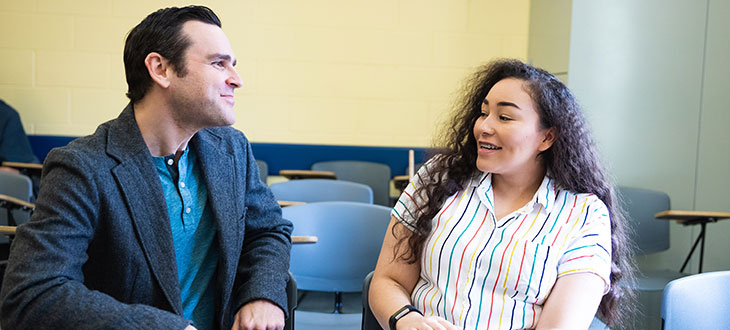The art of the challenging chat
Student intergroup dialogue facilitators promote using conversation to navigate conflict
How do you react when you hear something offensive? Do you put up a wall and walk away, or do you engage in a conversation to educate the offender? While the former is often a knee-jerk reaction, the latter option can open a door to better relationships and positive social change.
At Central Michigan University, philosophy faculty member Andy Blom and Shannon Jolliff-Dettore, director of LGBTQ services and gender equity programs, are training students to find common ground through conversation.
Intergroup dialogue is a sustained, facilitated face-to-face conversation between members of two or more social identity groups. These discussions provide participants a safe way to explore new perspectives, increase their understanding of others, build respect and empathy, and develop skills to live in an increasingly multicultural society.
"It takes courageous critical thinking to question your own beliefs, values and world view." – Shannon Jolliff-Dettore, director, LGBTQ services
The process has been taught at CMU for about 10 years, Blom said. It is supported by a partnership between the College of Liberal Arts and Social Sciences and the division of Enrollment and Student Services Fifteen to 20 students enroll each semester in the cultural and global studies intergroup dialogue facilitation course, and they can earn internship credit for serving as facilitators for another cultural and global studies course, Racism and Discrimination in America through Dialogue, that enrolls hundreds of students each year.
Defusing uncomfortable situations
Annika Clemens, a senior integrative public relations major from Bronson, Michigan, has been a student facilitator for several courses and campus events.
Clemens describes herself as mixed race — half black, half white. For many years, she was the only black student in her school and one of only a few people of mixed race in her entire hometown. She grew up having awkward conversations with people who asked her about her race and ethnicity.
Now, as a facilitator, she helps others develop tools to have challenging conversations without the embarrassment she often felt — on campus and out in the community.
Dealing with offensive comments
Clemens said ignorant comments are often a doorway to build understanding. "Even when I don't like what I'm hearing, I know the best learning opportunities come from those moments," she said. Clemens uses the following steps when responding to challenging comments:
During her communications internship at the Kresge Foundation, Clemens found herself putting her facilitation skills to work with colleagues during a racial equity staff retreat. Her supervisor was impressed and asked her to design a "crash course in dialogue" for the organization's leaders. "I noticed there was often limited time in meetings for people to work together in groups, and I shared some tools and resources I'd learned at CMU to use that time most effectively," she said.
Self-knowledge is key to successful dialogue
Jolliff-Dettore said intergroup dialogue facilitators push participants to deeply examine their opinions and to question what have they seen, experienced or been taught to believe.
"We first ask participants to reflect on their own socialization, the way they have been trained to know things. It takes courageous critical thinking to question your own beliefs, values and world view," she said.

Students also begin to identify the ways they present themselves and how they are viewed by others — their social identities. This can include seeing themselves as members of a particular racial or ethnic group, a gender group, a social class, a political party, or religious body. They also determine their conflict management styles, which help them understand how they react when faced with challenging situations.
With a clearer understanding of themselves, students are better prepared to engage with others in dialogue.
"Dialogue is the key to a better world. Sharing our differences without preaching or lecturing allows us to seek similarities. People who participate in these sessions are often surprised to learn how much they have in common with one another," Clemens said.
How it works
Successful intergroup dialogue requires trust among participants, so facilitators work on developing a sense of community in the class before they begin challenging conversations. Students in the class establish rules for their discussions and hold each other accountable.
A pair of co-facilitators, each representing different social identities leads students in conversation, using tools such as the LARA method of communication: listen, affirm, respond and add information.
"We focus on listening for understanding and to build connection," Blom said.

Extending conversations beyond the classroom
As more students express interest in learning intergroup dialogue, CMU has doubled the number of course sections available in recent years, Blom said.
Jolliff-Dettore and Blom also are working with leaders across campus to bring the tool to more students, faculty and staff. They have developed workshops for Leadership Safari guides and IMPACT student mentors and 17 hours of training for student and professional staff in Residence Life.
Student facilitators frequently volunteer at events like Conversations that Matter, guiding discussion among students, faculty, staff and community members on a challenging topic and ensuring that everyone has a chance to participate.
Blom said the open-ended process enables people to work together and to find common ground. Eventually, the process may lead to building solidarity with a new group of people and working for social justice — it just takes time.
"Every issue we encounter in life presents a new opportunity to move along a continuum of understanding. On one end, we lack information or choose to remain ignorant, and on the other, we have a deep understanding of an issue and are actively seeking social change. In between the two, there are countless opportunities to broaden our perspective and deepen our understanding," Blom said.